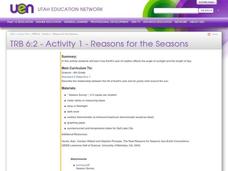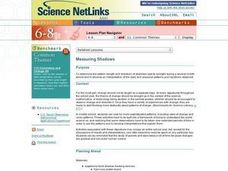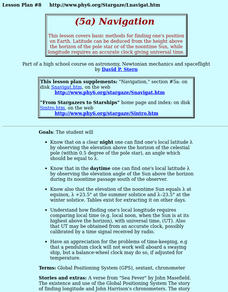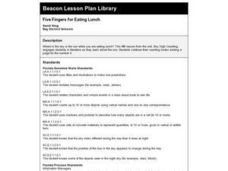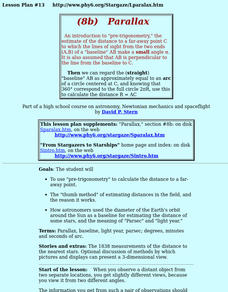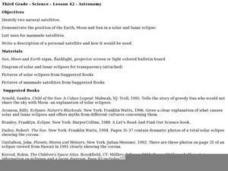Curated OER
Solar Surface Details
In this solar surface worksheet, students use a photograph taken by the Swedish Vacuum Telescope to answer 6 questions about the solar features in the photograph. Students determine the scale of the image, they determine the smallest...
Curated OER
The Solar Cycle
Learners research the solar cycle. In this Science lesson, students use the internet to investigate the solar cycle. Learners produce a spreadsheet and graph from the information collected.
Curated OER
Solar Powered Cars
Young scholars build and race solar powered cars after a teacher lecture. They answer questions based on their experiences with the car they build.
Curated OER
Our Solar System
Students analyze the theories of the formation of the universe and solar system. Students analyze planetary motion and the physical laws that explain that motion: Rotation, Revolution, Apparent diurnal motions of the stars, sun, and...
Curated OER
Reasons for the Seasons
Sixth graders conduct and analyze a survey that explores public perceptions about the reasons for seasonal change. They measure the changing length of days, observe shadows and discuss how the Earth's axis of rotation affects the seasons.
Curated OER
Graphing Sunspot Cycles
Students explore sunspots and then graph them to analyze the data. In this sunspot cycles lesson students complete an activity sheet and complete questions.
Curated OER
Measuring Shadows
Students determine the pattern (length and direction) of shadows cast by sunlight during several month period, and develop interpretation of daily and seasonal patterns and variations observed.
Curated OER
Solstice And Equiniox Curriculum
Students engage in a lesson that investigates finding the dates of the solstices and equinoxes. They define the terms related to the concept and conduct research in order to explain the physical occurrences. They also relate to how the...
Curated OER
Constellations
Young scholars explore the major constellations. After reviewing the Earth's basic motions and their significance, students discuss the moon's orbit and revolutions. Using a Digitarium Alpha portable planetarium projector, they observe...
Curated OER
Astrology: Fact or Fiction?
Students explore the topic of astrology and review the beliefs behind it. They read sample horoscopes. Using a portable digital planetarium, they view the night sky and the zodiac constellations. They examine and discuss the science...
Curated OER
Space Search
In this space worksheet, students identify and locate vocabulary terms and names related to space. There are 26 words located in the puzzle.
Curated OER
Alphabet Letter S
In this alphabet letter S worksheet, students look over three pictures and then fill in each blank with an S that finishes stating the name of the picture.
Curated OER
Navigation
Students study the basic methods for finding one's position on Earth. Latitude can be deduced from the height above the horizon of the pole star or of the noontime Sun, while longitude requires an accurate clock giving universal time.
Curated OER
A Galactic Fact Sheet
In this galactic fact worksheet, learners read through important facts about galaxies, their shapes, and distances from the Sun.
Curated OER
Solar System (Lesson 2)
Eighth graders identify the objects that make up the solar system. They define new vocabulary and practice using them. They discover that the sun is a star.
Curated OER
The Celestial Sphere
Students are introduced to the celestial sphere, describing its apparent rotation and the special role of the pole star.
Curated OER
Earth and Seasons
Sixth graders comprehend that the path Earth takes as it revolves around the sun is called its orbit. They also comprehend that the axis is an imaginary line that passes through Earth's center and its North and South Poles. Students...
Curated OER
Five Fingers for Eating Lunch
First graders listen to the book, The M&M's Brand Counting Book, discuss the one-to-one correspondence and count the candies in the story. They focus on the number five, and listen to the story Sun Up, Sun Down, discussing the...
Curated OER
Mass Matters
Fourth graders, in pairs, explore the relationship between a star's life and its mass. They use a concept map to illustration the three categories of stars.
Curated OER
Parallax
Students discover how astronomers used the diameter of the Earth's orbit around the Sun as a baseline for estimating the distance of some stars, and the meaning of "Parsec" and "light year."
Curated OER
Tracking the Movement of Sunspots
Students examine how the development of new technology has increased our knowledge of how the sun works. Students study sunspots through the use of solar imaging from satellite instruments.
Curated OER
Science - Lesson 42 - Astronomy
Third graders demonstrate the position of the Earth, Moon, and Sun in a solar and lunar eclipse. They list uses for manmade satellites and write a description of how a satellite would be use.
Curated OER
As the World Turns
Third graders read books and participate in class discussions about the motion of the stars and planets and moons in relation to the Earth. In small groups, 3rd graders act out these movements to music.
Curated OER
Friendship Mobiles
Students discuss how the sun, wind, clouds and other elements of nature can be their friends. They create mobile demonstrating this.
Other popular searches
- Sun and Stars
- Sun and Stars Diagram
- The Sun and Stars
- Sun Moon Stars
- Moon, Sun and Stars
- Sun and Stars Powerpoint
- Moon Sun and Stars
- Sun and Stars Webquest
- Sun and Stars Web Quest
- Sun, Moon, Stars
- Sunflower Stars
- Sun, Moon and Stars






